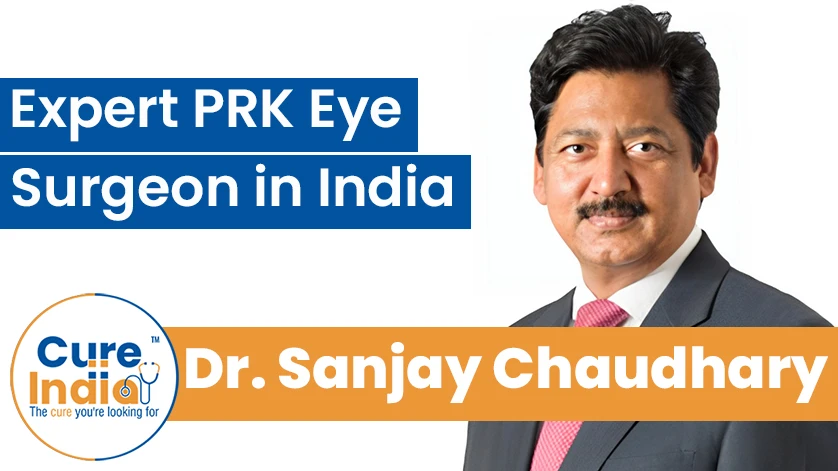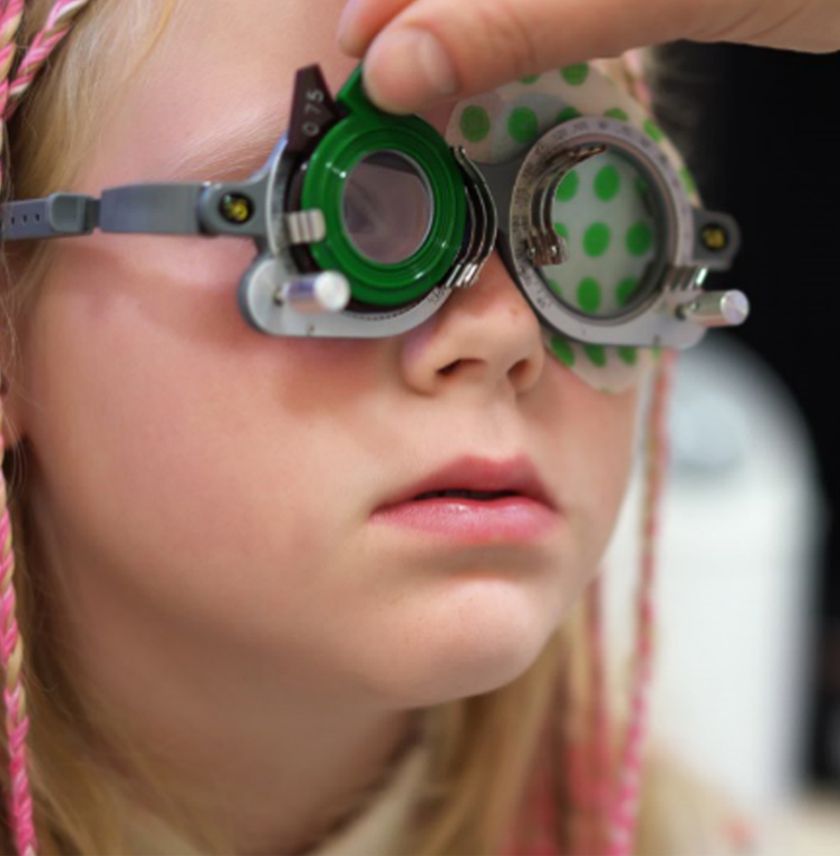PRK Eye Surgery in India- Top Doctors, Best Hospitals & Costs
Every year, hundreds of patients travel from Kenya, Congo, Ethiopia, and Nigeria to look for specialised eye care treatments. Many try to access improved health care that is either expensive or unavailable locally. Among the best places these medical tourists go to is India. It is famous because it has modern healthcare facilities, internationally trained doctors, world-class PRK eye hospitals, and charges less for treatment. This makes it an ideal destination for treatments such as photorefractive keratectomy or PRK eye surgery.
For African patients, surgeries in India cost as little as opposed to popular medical tourism destinations such as Thailand, Turkey, or the USA. Additionally, India boasts advanced healthcare infrastructure with modern technology and experienced medical personnel, attracting patients looking for value for their money.
What is PRK Eye Surgery?
PRK is an abbreviation for photorefractive keratectomy. It is a form of laser vision correction that alters the shape of the cornea to improve eyesight. The difference between LASIK and PRK eye surgery is that while LASIK involves creating a flap over the cornea, PRK removes the cornea's thin outer layer (epithelium) to reshape the tissue beneath this layer.
PRK eye surgery does not require cutting open their corneas. So, it is ideal for patients whose corneas are not thick enough for LASIK. PRK is popularly used to correct myopia (shortsightedness), hyperopia (longsightedness), and astigmatism by modifying the shape of the cornea. This allows people to see clearly without glasses or contact lenses.
What are the Benefits of PRK Eye Surgery?

PRK eye surgery offers several benefits, especially to patients who may not be fit for other laser eye surgeries:
- Suitability for Thin Corneas: PRK vision correction is the best option for people with thin corneas who aren't ideal for LASIK. It saves a lot of corneal tissue because no corneal flap creation is required during the PRK procedure.
- No Risk of Flap Complications: There is no creation of a flap during PRK. Therefore, there is no risk of flap complications, unlike with LASIK.
- Long-Term Stability: PRK laser eye surgery achieves long-term vision correction, hence stable vision. Although similar outcomes are achieved in both instances, long-term follow-up indicates less regression with PRK than with LASIK.
- Reduced Risk of Dry Eyes: PRK laser eye surgery reduces the risk of postoperative dry eyes as opposed to LASIK. Such patients will find this beneficial, especially since they already have dry eye syndrome.
- High Success Rate: PRK has a high rate of success when it comes to improving eyesight, with many patients attaining 20/20 vision or even better after its performance.
What Does PRK Eye Surgery Treat?
The primary purpose of PRK eye surgery is to correct refractive errors that damage the way light comes into the eye. Such errors include the following:
- Myopia (nearsightedness): Myopia refers to persons with impaired distant vision but who can see near objects well. PRK makes clearer far-off sight possible through corneal reshaping that allows light to fall accurately on the retina.
- Hyperopia (farsightedness): Hyperopia happens when an individual sees clearly at long distances while having an unclear view of things that are near them. PRK corrects hyperopia through corneal surface modification, ensuring optimal focusing of light on the retina.
- Astigmatism: Astigmatism entails unclear vision, whether far or near, because an irregularly shaped cornea prevents light from focusing correctly anywhere. For clearer vision, PRK eye surgery is used to correct the abnormally shaped cornea.
Many Africans who have vision problems consider having PRK laser eye surgery in India for its affordability and effectiveness.
What is the Step-by-Step Procedure for PRK Eye Surgery in India?
- Step 1: Pre-Surgery Evaluation: The ophthalmologist will firstly determine if the patient is suitable for PRK. Thus, he is supposed to check the thickness of the cornea, the refractive error, and any complications with the eye that may not show at the moment.
- Step 2: Preparation: To help reduce pain during the operation, the patient is administered anesthesia eye drops on the morning of the day of surgery. The eye will be cleaned while opening the eyelid is done by inserting a speculum.
- Step 3: Removal of the Epithelium: Using a blade, brush, or laser, surgeons remove the upper layer of the corneal tissue called the epithelium.
- Step 4: Corneal Reshaping: A laser changes the shape of the cornea's underlying structure. This eliminates small sections of corneal tissue with precision,, allowing light rays to focus on the retina correctly.
- Step 5: Post-Surgical Care: Post laser treatment, a contact lens is worn for protection of the eye during the healing process. After a few days, epithelium grows back on its own. The patient receives medication in the form of eye drops to prevent any chances of infection and reduce inflammation.
Experienced Surgeons for PRK Eye Surgery in India
Choosing the right doctor for PRK surgery in India can correct or diminish your vision. Unlike LASIK, PRK involves reshaping the cornea’s surface without creating a corneal flap, making it a better option for patients with thinner corneas. India has a range of experienced refractive surgeons who specialise in this technique, utilising the latest excimer lasers and decades of surgical experience. Let's take a look at some of the best doctors for PRK surgery in India:
1. Dr. Suraj Munjal
Dr. Suraj Munjal is a top refractive surgeon and a leading PRK eye surgery specialist in India. With over 20 years of experience, he has helped thousands of patients achieve clear vision through advanced surface ablation techniques, including PRK, Trans-PRK, and LASIK alternatives for thin corneas.

2. Dr. J. S. Titiyal
With extensive expertise in advanced surface ablation procedures, Dr. J. S. Titiyal is an eye specialist for PRK surgery in India. With over 37 years of experience, he has made a name for himself in corneal and refractive procedures and formerly led the Cornea & Refractive Surgery division at AIIMS, New Delhi. His understanding of corneal biomechanics has made him a specialist for patients requiring PRK eye surgery, especially those with complex or sensitive corneal conditions.

3. Dr. Sanjay Chaudhary
Dr. Sanjay Chaudhary is a veteran ophthalmologist with 30+ years of surgical experience, recognised for his proficiency in PRK, LASIK, ICL, and other refractive eye surgeries. As the Founder of Eye7 Eye Hospitals in Delhi, he has been consistently adopting the latest laser technologies and delivering personalised surface ablation treatments to both domestic and international patients.

4. Dr. Sonal Gupta
Dr. Sonal Gupta is a leading ophthalmology specialist in India who is known for her expertise in PRK and other surface ablation techniques. With over 28 years of experience in corneal evaluation and personalised refractive planning, she is adept at treating patients who may not qualify for LASIK due to thin or irregular corneas.

What is the PRK Eye Surgery Cost in India?
Many African patients opt for PRK eye surgery in India due to its cost-effectiveness. The PRK surgery cost in India is remarkably lower here in India than in nations such as the USA and the UK. Thus, it is feasible for most international patients.
| Treatment |
Cost in India |
Stay in India |
| PRK Eye Surgery Cost |
$1,500 |
5-7 days |
PRK surgery is cheaper in India and yet still maintains high-quality treatment. In India, the hospitals have state-of-the-art equipment together with top-notch specialists in eye care. For this reason, patients can get first-rate treatment services at an affordable price, unlike in other countries.
Why PRK Laser Eye Surgery in India?
India offers an excellent PRK eye surgery alternative for African patients who want cheap and good-quality eye care services. India has become the best destination in medical tourism due to its state-of-the-art healthcare facilities, both in terms of affordable treatment and highly experienced PRK eye surgeons.
PRK Eye Surgery vs. LASIK

Both PRK and LASIK are effective laser eye surgeries despite significant differences like:
- Corneal Thickness: PRK is ideal if your corneas are thin, whereas LASIK has a corneal thickness required for forming a flap.
- Flap Creation: LASIK involves creating a corneal flap but not PRK. That's why people are advised to opt for it over LASIK, especially when they fear complications related to flaps.
- Recovery Time: It takes longer for one to recover from PRK eye surgery because epithelium needs time to regenerate. This process may last from several days to one week. This period is shorter in LASIK patients because their vision usually improves more quickly after surgery.
- Comfort: When it comes to comfort during recovery, LASIK patients often feel less pain compared to PRK patients. So, it can probably be said that the former has a better chance of feeling more comfortable than the latter.
- Suitability: PRK is suitable for a wide range of patients, including those who have dry eyes, thin corneas, or active lifestyles where dislocation of a flap may occur.
How Should I Prepare Before a PRK Eye Surgery in India?
There are a few steps to prepare for PRK laser eye surgery:
- Pre-Surgery Consultation: Consult the ophthalmologist to talk about your vision objectives and figure out if a PRK is the suitable procedure for you.
- Avoid Wearing Any Contact Lenses: If you are used to wearing contact lenses, you have to stop using them a few days or weeks before the surgery. The cornea can change its shape because of contact lenses, and that is why it is vital to remove them.
- Arrange Transportation: Because after the operation, you will not be able to drive anymore, decide on somebody who will take you home.
- Follow Pre-Surgery Instructions: Your doctor will provide specific instructions regarding medication, eye drops, and any other preparations. Therefore, you will need to adhere strictly to these guidelines.
- Recovery Time: The PRK recovery period is longer than that of LASIK. To enable your eyes to get well, consider taking a few days off from strenuous daily activities.
LET'S PLAN YOUR
TREATMENT IN INDIA
PRK Eye Surgery in India FAQs
PRK is the better option because it doesn't leave a flap on your cornea. In the long run, it is therefore far safer and more successful than LASIK.
PRK eye surgery is permanent. It cannot, however, stop the ageing process of the eyes or the potential development of visual problems as a result. You can anticipate these alterations if you undergo PRK surgery at 40 years of age or older.
Following PRK laser eye surgery, most patients should anticipate experiencing some degree of discomfort or slight pain for up to three days. Most of the time, regular administration of OTC pain relievers can effectively manage this.
There have been certain cases where there is visual impairment after PRK. However, this is very unlikely.
According to studies, over 95% of patients obtain at least 20/40 vision, and about 75% of patients acquire 20/20 vision or better with PRK vision correction.
No. PRK does not leave a visible scar on the eye. Once healing is complete, the cornea becomes clear and smooth, without any permanent scarring.
You must be 18 years of age or older, ideally 21 in order to undergo a PRK eye surgery, as at that point, your eyesight will no longer change. Both your corneas and your overall eye health must be in good condition to be deemed eligible for the procedure.











